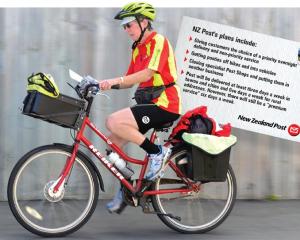Despite widespread criticism, Otago mayors seem resigned to a proposed reduction in rural mail delivery and are staying out of the submission process.
The region's five mayors and district councils did not make submissions on New Zealand Post's plan to cut rural services to three days a week, which attracted opposition from communities, businesses and organisations nationwide.
Although mayors felt sympathy for rural residents, they appreciated New Zealand Post was making a reasonable business decision.
New Zealand Post chief executive Brian Roche said delivery services were suffering under the digital revolution and the decline in mail volume was forecast to continue.
By 2018, it was expected mail would be half the volume it was in 2002.
Dunedin Mayor Dave Cull said he was ambivalent about the proposal. He understood supply and demand but was also a rural delivery recipient and said it would be a ''tragedy'' not to get the newspaper delivered each morning.
Central Otago Mayor Tony Lepper also saw sense in the proposal and said New Zealand Post made a ''compelling business case''.
Business was struggling and service cuts were the only way it could survive, he said.
''It's not what we want. It will definitely affect our community, but people will learn to live with it.''
Clutha Mayor Bryan Cadogan said New Zealand Post was in a ''sticky situation'' and the community had to work with the organisation to make a business plan which accommodated everyone.
''Rural mail services are hugely important,'' he said.
Queenstown Lakes Mayor Vanessa van Uden said although proposed cuts would ''undoubtedly'' have an impact, it was ''a tricky one''.
''From a commercial point of view, someone has to pay, and if they're not making ends meet, it either means that the cost of it is going to go through the roof . . . or [they] take whatever steps they can to make ends meet.''
It was a ''cold, hard fact of life'' which made things difficult for the rural community, she said, and the Queenstown Lakes District Council saw value in working with the community to ''find out ways of filling the gap''.
Waitaki Mayor Alex Familton said some rural residents were prepared to pay more for their mail delivery and he hoped New Zealand Post would consider other options.
''The question I'm asking quite seriously is has New Zealand Post attempted to cost an alternative package that might supply [mail] every day? I'm a bit concerned that the final proposal has been dropped on us and that it's going to be a three-day week.''
He felt sympathy for rural dwellers, particularly women, because he said they needed as much contact with the outside world as possible and many were years away from connecting to fast and reliable internet.
Rural Couriers Society (Coural) general manager Bryan Running said there was an option of paying more for a ''premium'' service included in proposed changes, although he expected drivers would struggle to deliver the volume of mail in half as many days.
He said as rural residents connected to fast internet, they would drive up the volume of mail deliveries by shopping online.
As a co-operative owned by independent rural delivery contractors employed by New Zealand Post, Coural had submitted its concerns about the impact of proposed changes.
Waitaki MP Jacqui Dean had misgivings about the proposal and its impact on small businesses which she said relied heavily on rural mail for product distribution.
Delivery of vital goods including prescriptions, milk and bread would be affected, she said.
Mail stores in some rural communities also served as community centres and business premises, and any reduction in services could affect their viability.
The Otago-Southland branch of the Rural Delivery Contractors Association has planned a meeting for April 7.
Submissions on the proposal closed on March 12.


